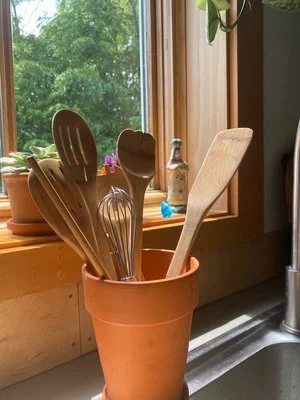Elena brought a great prompt to our regular writing group a few weeks ago. She suggested that we write odes together. She described an ode as a poem or prose poem written to an ordinary thing that might need to be celebrated, and usually is not. Inspired by Elena’s suggestion, I dropped right in to writing about the clay pot by my kitchen sink. You could say that an ode brings the ordinary to extraordinary status. I urge you to try your hand at writing an ode or two — just to see what it opens up for you.
I had fun with this prompt and I’m struck by the sweet power of this form, which has both formal and informal interpretations. We spent 20 minutes writing together in long hand — here is a lightly edited version of what emerged from my pen that day.
The clay pot there by the sink is porous by nature. Flute shaped and open to the sky, she conceals an opening in her foot to release any overabundance of water. There too is her constant companion the terracotta dish to accept any overflow. (And she just took on a gender . . . )
Clay Pot is utilitarian, unadorned, a rich terracotta that deepens when she is wet. Her rim is a simple collar with a smooth lip. This one who sits on the edge of my kitchen sink has a cracked foot that is held together only because of her placement in the familiar of her dish. Created to receive soil and the roots of a plant, she has been commandeered to take on wooden spoons, spatulas, an occasional wet set of chopsticks. The kitchen scissors land here after a wash – rarely, very rarely, a sharp knife. (The household knife sharpener is scornful of such placement.) This Clay Pot is unusually tall, lanky even. She has accepted her plight near the faucet – alone.
Her line of descent would put her amongst others of her kind on a porch somewhere or nestled along a garden path. It was her tallness that attracted my attention, while I scanned the clay pot aisle at Agway, and I lifted her up and out of her original calling into this quiet occupation at my kitchen sink.
And now I realize that she is not so alone. Up across the sink, a wooden spoon is perched on the shelf edge – a kindred spirit – his elegant simple shape is untouched by a finish of any kind — whittled from cherry by loving hands. This poor chap has never fulfilled his purpose although the perch isn’t “decorative” as his presence is imbued with meaning that continues to unfold for me.
These two, clay pot settled on the drainboard longing for brown earth and roots pressing against her sides – wooden spoon wishing for that last caress of the finest sandpaper grit and thirsty for being dressed with an oil finish. These two keep each other company at my kitchen sink and contribute to the pleasure I take in being home.
The cracked angel has a twin, but that is another story.
There is a whole neighborhood here by my kitchen sink. As I wrap up this writing time, I’m seeing that they have “a life” of their own. Although I take great pleasure in my kitchen sink neighborhood, I’m seeing myself as a participant, not necessarily the center of this universe.
I wonder . . . Do they miss me when I close up the house and go?
And as I consider this little piece of writing, I wonder what it would be like to write it again without anthropomorphize-ing so much, or even at all . . .

